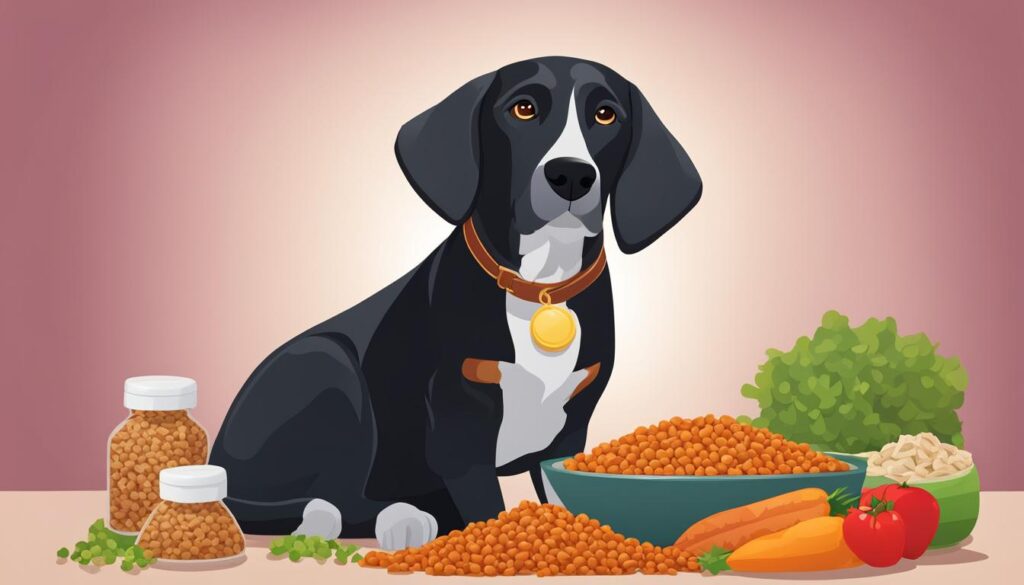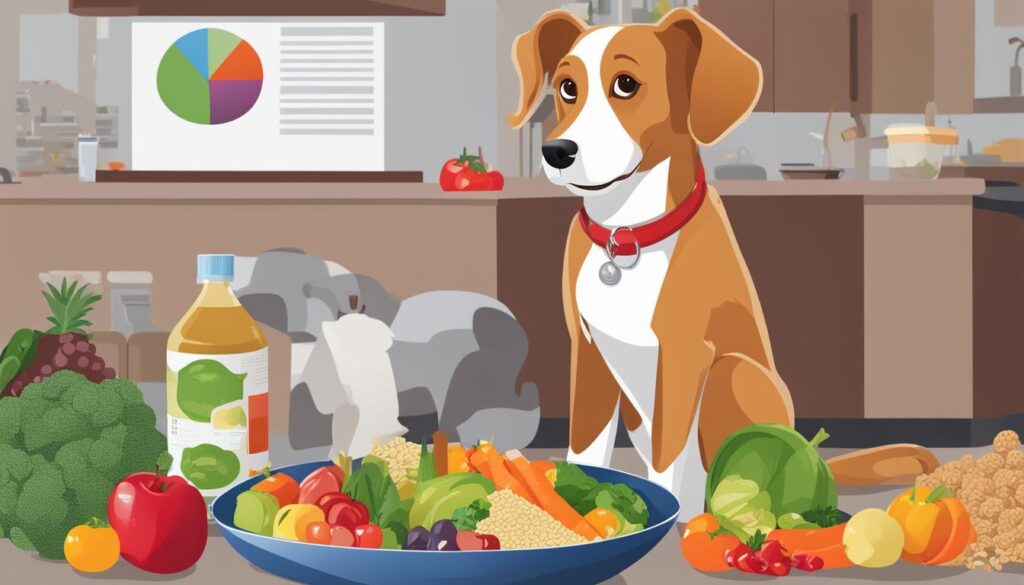As your furry companion enters their golden years, their nutritional needs undergo a significant change. A well-balanced diet is crucial in supporting their health and longevity. Giving your senior dog the right diet may require small adjustments, but it can make a significant difference in their overall well-being.
The nutritional needs of senior dogs should focus on maintaining lean body mass, promoting optimal digestion, and supporting immune function. With age, dogs may have trouble absorbing nutrients and may require specific dietary adjustments to maintain an ideal weight.
During this guide, we will provide a comprehensive overview of the key considerations for senior dog nutrition, including how to select the best dog food for senior dogs, how to supplement your furry friend’s diet, and how to maintain their joint health.
Whether you’re dealing with a picky eater or a dog with special dietary needs, this guide is here to help you create a nutritious and balanced senior dog diet. Ready to get started on supporting your senior dog’s nutritional needs? Let’s dive in.
Key Considerations for Senior Dog Nutrition
As your furry friend grows older, their dietary needs will change. Understanding the specific nutritional needs of senior dogs is crucial for maintaining their overall health and well-being. Here are some key considerations for senior dog nutrition:
Less Calories
Senior dogs are generally less active than when they were younger. As a result, they require fewer calories. Overfeeding your senior dog can lead to obesity and other health problems. Speak to your veterinarian about the appropriate caloric intake for your pet.
More Protein
Senior dogs require more protein than younger dogs to maintain muscle mass and support organ function. However, the protein should be of high quality and preferably from animal sources. Talk to your veterinarian about the best sources of protein for your senior dog.
Special Nutrients
Senior dogs may require additional nutrients, such as omega-3 fatty acids, glucosamine, and chondroitin, to support joint health and cognitive function. Speak to your veterinarian about supplements or specialized diets that may be suitable for your pet.
Hydration
Senior dogs may drink less water, leading to dehydration. Make sure your dog has access to fresh water at all times and consider adding wet food or broths to their diet to increase their water intake.
| Nutrient | Importance | Sources |
|---|---|---|
| Protein | Supports muscle mass and organ function | Animal sources such as chicken, beef, and fish |
| Omega-3 Fatty Acids | Supports cognitive function and joint health | Fish oil, flaxseed |
| Glucosamine and Chondroitin | Supports joint health and mobility | Supplements or specialized diets |


By understanding the unique nutritional needs of your senior dog, you can ensure they enjoy their golden years in good health. Consult with your veterinarian for personalized advice to meet your pet’s specific requirements.
Finding the Best Dog Food for Senior Dogs
Choosing the best dog food for your senior companion can be overwhelming, with so many brands, formulas, and ingredients to consider. However, selecting the right food is crucial to maintain your furry friend’s health and well-being. Here are some vital aspects to consider:
Look for Senior-Specific Formulas
Many dog food brands offer senior-specific formulas tailored to meet aging dogs’ nutritional needs. These formulas usually have lower calorie content to help prevent obesity and contain nutrients like glucosamine and chondroitin to support joint health. Be sure to check the packaging for the life stage identification to ensure you’re selecting the right formula for your senior dog.
Choose Whole Foods
Real food ingredients should compose the majority of your senior dog’s food. Look for whole ingredients like meats, vegetables, and fruits to ensure your dog receives essential nutrients. Avoid foods that contain fillers like corn, soy, or wheat, as they hold little nutritional value and may cause digestive issues.
Avoid Foods High in Fat or Protein
While dogs require fat and protein to stay healthy, senior dogs have lower energy and activity levels, so high levels of fat or protein can be harmful to their health. Look for foods with moderate levels of protein and fat to ensure balanced nutrition.
Assess Any Special Dietary Requirements
Your senior dog may have specific dietary needs, depending on their current health status or any medical conditions. For instance, dogs with kidney issues may require a low-protein diet to manage their condition. Be sure to discuss any dietary concerns with your veterinarian to ensure you’re providing the right nutrition plan for your senior dog.
Remember, choosing the best dog food for your senior dog can be challenging but is essential to promote their overall health and well-being. Take time to research different brands and formulas, read ingredient labels, and assess your dog’s specific needs for a well-rounded senior dog diet.


Senior Dog Supplements: Enhancing Their Well-being
As your furry friend ages, they may require additional support to maintain their overall well-being. Senior dog supplements can provide these essential elements to help keep your dog healthy and happy. Here are some common senior dog supplements to consider:
Vitamins
Vitamins provide essential nutrients that can help promote a healthy immune system, improve vision, and support healthy skin and coat. Vitamin supplements that may benefit senior dogs include Vitamin E and Vitamin B12. However, it’s important to speak with your veterinarian first before adding any vitamin supplements to your dog’s diet as overdosage can be harmful.
Joint Support Formulas
Joint supplements can help alleviate the pain and discomfort that can come with aging and mobility issues in senior dogs. Some popular joint supplements for senior dogs include glucosamine and chondroitin. These supplements work to improve joint health by reducing inflammation, promoting cartilage health, and supporting joint flexibility. Before giving any joint supplement to your furry friend, be sure to consult with your veterinarian first.
Antioxidants
Antioxidants are an essential supplement that can help combat disease and promote healthy aging in senior dogs. Antioxidants, such as Vitamin C and beta-carotene, can help neutralize harmful free radicals in your dog’s body, reducing the risk of diseases such as cancer. These supplements can also support eye health, immune function, and overall vitality in senior dogs.
When it comes to choosing senior dog supplements, it’s essential to consult with your veterinarian to determine which supplements are best suited to your furry friend’s unique needs. Remember, while supplements can provide additional nutritional support, they should never replace a well-balanced diet or take the place of any prescribed medications.


Promoting Senior Dog Joint Health
As dogs age, their joint health becomes increasingly important. Many senior dogs experience arthritis and other mobility problems that can significantly decrease their quality of life. Fortunately, there are several ways you can help maintain your aging dog’s joint health through their diet.
Adjusting Your Aging Dog’s Diet
One way to promote joint health in senior dogs is through their diet. You should consider adding joint-friendly foods, such as fatty fish and leafy greens, to their meals. These foods contain omega-3 fatty acids, which have anti-inflammatory properties and can improve joint health.
You may also consider switching to a diet specially formulated for senior dogs. These diets include higher levels of joint-supporting nutrients such as glucosamine and chondroitin sulfate.
Adding Joint Supplements to Your Dog’s Diet
Another way to promote senior dog joint health is by adding supplements to their diet. Supplements such as glucosamine and omega-3 fatty acids can help reduce inflammation and support healthy joint function.
| Supplement | Description |
|---|---|
| Glucosamine | A natural compound that can protect and repair joint cartilage. |
| Omega-3 Fatty Acids | These fats have anti-inflammatory properties and can help reduce joint pain and stiffness. |
When considering joint supplements for your senior dog, be sure to consult with your veterinarian to determine the right dosage and combination of supplements for your pet.
Encouraging Exercise
Regular exercise can also help promote joint health in senior dogs. Gentle activities such as short walks and swimming can help keep your aging dog’s joints mobile and promote overall health.
It’s important to note that overexertion can be harmful to senior dogs and worsen joint pain. For this reason, you should discuss an exercise plan with your veterinarian to ensure it is safe and appropriate for your aging companion.


By making dietary adjustments, adding joint supplements, and promoting exercise, you can help maintain your senior dog’s joint health and improve their quality of life. Remember to always consult with your veterinarian before making significant changes to your pet’s diet or lifestyle.
Tailoring a Nutritious Diet Plan for Your Senior Dog
When it comes to senior dog nutrition, a one-size-fits-all approach does not work. Each senior dog has unique nutritional needs depending on factors such as weight, activity level, and any medical conditions. Therefore, it’s crucial to create a diet plan tailored to your senior dog’s specific needs.
Consult with your veterinarian to determine your senior dog’s nutritional requirements. They can advise you on appropriate portion sizes, frequency of meals, and any dietary restrictions that must be accounted for.
Consider the following when creating a diet plan for your senior dog:
- Protein: Senior dogs still require high-quality protein to maintain muscle mass, but it’s essential to choose protein sources that are easy for them to digest. Consider lean meats, eggs, or high-quality dog food made specifically for senior dogs.
- Fiber: Older dogs may have trouble with constipation, so adding fiber-rich foods can help promote regularity. Good sources of fiber include fruits, vegetables, and whole grains.
- Fats: Your senior dog still needs a healthy amount of fat in their diet, but it’s essential to choose healthy sources. Avoid foods high in saturated fats and opt for healthy sources such as fish, flaxseed, and coconut oil.
- Carbohydrates: While not all senior dogs need a high amount of carbohydrates, they can be a great source of energy. Choose carbohydrates such as sweet potato, brown rice, or oats.
- Water: As dogs age, they may become more prone to dehydration, so it’s crucial to make sure they always have access to fresh, clean water.
Keep in mind that your senior dog’s diet may need to be adjusted over time as they age and their nutritional requirements change. Regular check-ins with your veterinarian can help ensure your senior dog is getting the nutrients they need to stay healthy and active in their later years.


Conclusion
In conclusion, understanding the nutritional needs of senior dogs is crucial in promoting their overall health and well-being. As your furry friend ages, their dietary requirements change, making it essential to adjust your feeding habits accordingly.
By incorporating key considerations for senior dog nutrition, such as specific nutrients and dietary adjustments, you can ensure your pet gets the support they need to thrive.
When it comes to finding the best dog food for senior dogs, be sure to read ingredient labels carefully and look for life stage formulas that cater to your pet’s unique needs.
Additionally, supplements and joint health formulas can be beneficial in promoting your senior dog’s well-being.
Remember, a well-balanced diet plan tailored to your senior dog’s nutritional needs is crucial in maintaining their health and longevity. By consulting with your veterinarian and following practical advice, you can ensure your furry companion enjoys a happy and healthy life.
Keep your senior dog’s nutritional needs in mind and make informed choices to support their health and well-being as they age.
Stay tuned for more articles on Nutritional needs of senior dogs and their health.
FAQ
What are the nutritional needs of senior dogs?
Senior dogs require specific nutrients to support their aging bodies. These may include reduced calories, increased fiber for digestion, higher protein levels for muscle maintenance, and joint-supporting ingredients.
How should I adjust my senior dog’s diet to support their health?
To accommodate their changing needs, you may need to adjust the portion size and frequency of meals, introduce joint health supplements, and incorporate senior-specific dog food formulas that cater to their unique requirements.
What should I look for when choosing the best dog food for my senior dog?
Look for dog food with high-quality ingredients, including lean proteins, whole grains, and a balance of fruits and vegetables. Consider formulas specifically designed for senior dogs and consult with your veterinarian for any special dietary considerations.
Are supplements necessary for my senior dog’s health?
Supplements can be beneficial for senior dogs, particularly those that support joint health and provide essential vitamins and minerals. However, it’s important to consult with your veterinarian to ensure the supplements are appropriate and safe for your dog.
How can I promote joint health for my senior dog?
You can promote joint health by providing a diet rich in omega-3 fatty acids, antioxidants, and glucosamine, chondroitin, and MSM supplements. Regular exercise and weight management are also important to support your senior dog’s joint health.
How can I create a nutritious diet plan for my senior dog?
To create a nutritious diet plan, consider your dog’s age, weight, activity level, and any specific health conditions. Consult with your veterinarian to determine the appropriate portion sizes, meal frequency, and potential dietary restrictions for your senior dog.

